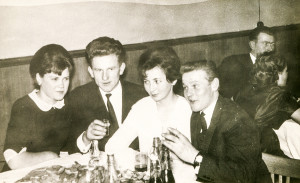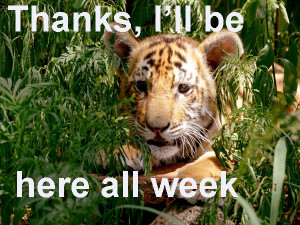No matter how worthy your message, no matter how personally passionate or invested you are in what you’re promoting — even if it’s your product, book, service, or religion — you must always be acutely aware that you’re a guest. As a guest, it is essential that you bring a gift for the host, don’t overstay your welcome, don’t dominate the conversation, don’t monopolize any one person, and don’t make yourself at home no matter how accommodating the company.
The thing about being in PR or marketing online is that no matter how pure your intentions, you will be scrutinized with skepticism. Who knows whether I actually love the books just written by my best friends, The Creator’s Code by Amy Wilkinson and Mindful Work by David Gelles — I do, and have ready Amy’s book and am savoring David’s right now — or if the publicity I have engaged in is authentic, unpaid, or even inspired. It doesn’t matter. My interest isn’t pure for a couple legitimate reasons, neither of which is “fair” but legitimate.
 First, I am a social media marketing and digital PR professional, which means I can easily be associated with shilling (and could very well be being compensated, though I haven’t); second, it is assumed that I have a natural conflict of interest since I know the writers, I have received early copies of the books, and they both know I do influencer outreach.
First, I am a social media marketing and digital PR professional, which means I can easily be associated with shilling (and could very well be being compensated, though I haven’t); second, it is assumed that I have a natural conflict of interest since I know the writers, I have received early copies of the books, and they both know I do influencer outreach.
And, you’re right, I did link both their books and their names! I really can’t help myself. And neither could you, I am sure. I really want their books to be powerfully successful business books and I am willing to take risks in order to get their good name out there!
I mean, I have seen both of these friends through their interminable writing process, have grabbed coffee, tried to be motivating and supportive without being one of those “so, how’s it going” jerks. I fully deserve to brag about their work everywhere with everyone. I feel entitled because I actually love the product. It doesn’t feel like work. In fact, sometimes I am so on board with what I am promoting on behalf of paid clients that I feel entitled to just go out there and crow!
And, see, that’s part of the problem: entitlement. Just because you can, should you? And if you do, does everyone involved understand your involvement?
Well, I am here to remind you that no matter how entitled you may well feel that the content you’re pitching deserves to be on the front page of reddit, that the bio of your best friend deserves to be in Wikipedia, or that every entrepreneurship and mindfulness site, forums, message board, group, and page deserves my 2¢ just because I am psyched about the subject matter, love the client, want to impress, or are even performing an end-of-campaign hail mary, you need to be more than painfully aware that you’re, in effect, acting as an interested party as a publicist, you need to be painfully clear about it. You need to be explicit. On reddit, on Wikipedia, on message boards, in emails, on reviews, and even on Facebook, Twitter, and Google+, to the best of your ability. And, you need to do your best.
If you’re reading this post, you probably need to take this doubly or trebly to heart because you’re probably a promoter, a publicist, a social media marketer, a digital PR professional, a marketer, a salesman, or even a social media influencer yourself. You’re not human, you’re not normal, you’re not the vox populi who are of the citizenry, who are the earnest, true, hearted, honest, and authentic.
“Me, not authentic?” you protest. It doesn’t matter how authentic you may be, your profession paints your authenticity with a thick veneer of skepticism. Can you blame the Internet? How many social media gurus and social media marketing experts have taught webinars on how to simulate authenticity? How to come across as authentic.
There’s a natural stigma associated with being in PR, marketing, publicity, and advertising. Is it a stigma as pungent as a lawyer’s? It depends on who you ask, where you are. I started my career first as a photographer, then poet, teacher, programmer, Linux/BSD system administrator (SA), and technologist before I entered marketing back in 2003. I have been online since 1983 when I bought my first IBM AT and Hayes 1200 baud modem and dialed in to local BBS communities before really blooming into the Internet age in 1993. From 1983 through 2003 I was pure. I was native. Now, as a marketer, I am forever the other. Sometimes I forget and become complacent that the Internet is not my house to pwn.
Ironically, none of these things are an issue in the message boards and forums that I engage socially, be it on the Adventure Riders, Motobrick, BMW MOA, or VGOF forums or deep in the groups and pages on which I chat about issues like rowing, erging, running, kettlebells, shooting sports, or whatnot. Maybe it’s just because I don’t currently have clients in these hobbies and pastimes of mine or maybe because when I am there, I take off my PR hat and put on my helmet, eyes and ears, rowing trou, running shoes, or chalk.
Either way, no matter what my intention is, no matter if I feel like I am safe and above reproach and at home in these communities, and no matter how I really don’t believe it’s important that I compulsively lead every conversation with “I’m a marketer,” I am reminded every day, after twelve years of doing this work, that no matter how many doors close as a result of my leading every online conversation with “I’m Chris Abraham and I’m a marketer,” there are many other doors that remain open or are opened down the line as a result of my honesty and transparency; and, even when I believe I am being honest, open, and transparent enough, it’s essential for each of us to audit ourselves.
Maybe you disclosed your associations and conflicts of interest at some point but it’s been a while. Do it again. I am sure most folks have forgotten and there’s surely an entirely new crop of folks who weren’t even there back when you last shared. Check your disclosures. Are they up-to-date? Are they too euphemistic? Do you need to read between the lines to grok that what you’re saying is that you do paid publicity for people and this might be a place where this happens? Do you also mention it inline with your reviews or shares? One of the big mistakes people make is they feel sure that the single line in the bio that’s hidden deep in the profile page is more than enough transparency even when everyone knows that scrutinizing everyone’s profile page isn’t a thing that anyone outside of Wikipedia ever does unless you’re suspected of it at all — and then it’s too late.
At the end of the day, remember who you are. Remember your place and your relationship with your community. It’s better leading your introduction with an uncomfortable conversation that alienates 33% of the community who will shun you because you’re probably just a dirty spammer anyway (they’ve all been duped and hurt before) or do you want to alienate 100% of the community when, after months or years, it’s revealed that you’ve been actively deceiving people — even though, technically speaking, you did put that one euphemistic line in your bio.
Letter of the law doesn’t cut it in social media. The thing about social media is that all of it is personal, none of it is professional; so, your get out of free card, “it’s not personal, it’s only business,” doesn’t work here at all because the nature of social media, even on message boards, reddit, Wikipedia, and Twitter where they allow aliases and don’t enforce real names, is personal, personal, personal, and the feuds, vendettas, and grudges can last for Internet generations.
And banned is as banned does and blocked is blocked.
Good luck, tiger — go git ‘em!






